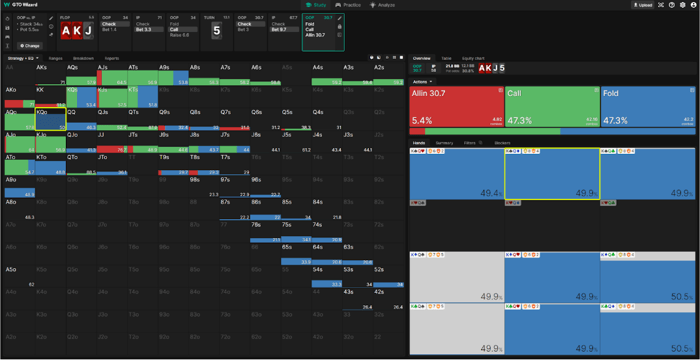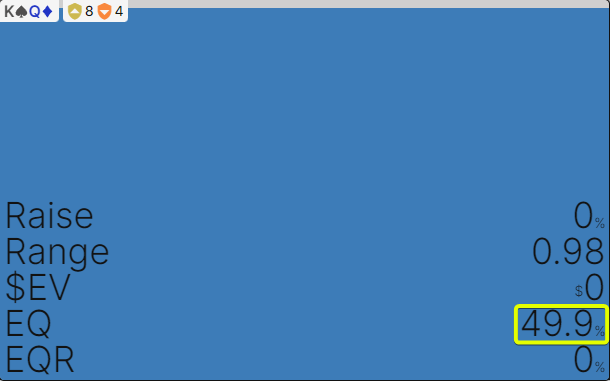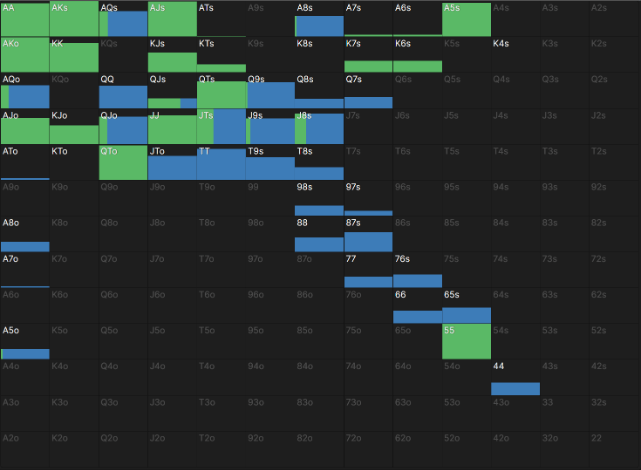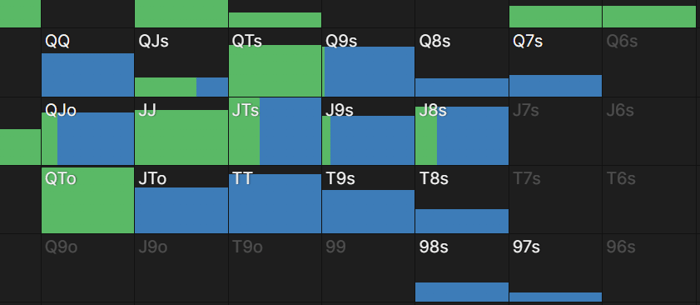
It was set to be the story of the summer, with Kristen Foxen deep in the largest WSOP Main Event of all time. However, it wasn’t to be as she fell just short of a historic place at the final table, busting in 13th place for $600,000.
In her final hand, she turned her second pair and gutshot straight draw into a bluff — a very interesting and advanced play from a player who had told PokerNews earlier in the tournament that playing at the PokerGO Studio had helped her hone her poker strategy skills, and prepare her for a deep run in the Main Event.
But was the turn shove actually GTO? We spoke with GTO Wizard to see if they can share some insight with the latest GTO Wizard Hand Analysis.
Daily Dose of GTO FREE Download
The Hand
According to the PokerNews reporting, Joe Serock opened to 2,400,000 from under the gun and Kristen Foxen called from the big blind. Foxen check-called a bet of 4,000,000 on the A♥K♥J♠ flop and the turn was the 5♠.
Serock sized up to 11,600,000 and Foxen then check-raised all in for 36,900,000. Serock took off his sunglasses, picked up his cards, and called to put her at risk.
Kristen Foxen: K♠Q♦
Joe Serock: A♠K♣
Foxen could still hit a ten for a straight, but the 6♥ river bricked, and she was eliminated.
Initial Analysis
According to GTO Wizard, upon closer inspection, we can see that KQo always folds. According to GTO Wizard, Foxen’s GTO strategy facing the double barrel on the turn was as follows, accounting for ICM.

To understand why KQ doesn’t raise, we need to first understand what makes a good bluff jam:
- We need to ensure that we are often behind for our bluff to be efficient
- We need to get enough folds by better hands
- Our bluffs should have some equity AFTER villain calls
- Our bluffs should unblock villain’s folds
Let’s break each of these down:
Ensure We Are Behind
In order for our bluff to be efficient, we need to ensure that when we are raising with a polarized range — “nuts or nothing” — we want our bluffs to have low equity as demonstrated in the Breakdown tab (see red bars).

We basically have a tie with ~50% equity, so we aren’t behind against Serock’s betting range.

Get Enough Folds From Better Hands
Serock should fold worse vs. Foxen’s play. Jamming the turn folds out hands such as Qx, Jx, some Ax and pocket pairs without a set.
Most of these hands we are ahead of when holding KsQd, so we don’t fold out much better hands.
This is how Serock should defend against the all-in:

Make Sure We Have Some Equity
Even if we were to be called, our improvability isn’t looking good either; straights aren’t as strong on 4 liners. We sometimes split the pot when we hit our straight with K♠Q♦.
Combodraws like Q♥7♥ or 10♥8♥ are much better to make this play with. The advantage these hands have over K♠Q♦ is that they have more live outs when Serock calls, as well as folding out more better hands.
Unblock Villain’s Folds
Our opponent should be bet/folding a lot of Qx gutshots without a heart (QxQx, QxJx as well as Q9s-Q7s), which we are blocking a large part of with the Q♦. Although less important of a factor in this hand, it’s still worth pointing out.

Conclusion
While Serock had an easy time with his decisions in this hand, Foxen had a tough last hand in the WSOP Main 2024 which ended up being a costly blunder. According to our estimates using the Compare EV tool, her all-in costs a whopping -$67,788.48 on average in theory.
Still, this play took a lot of guts so we gotta hand it to her being fearless at the table and having the heart to pull off such a power-move.




